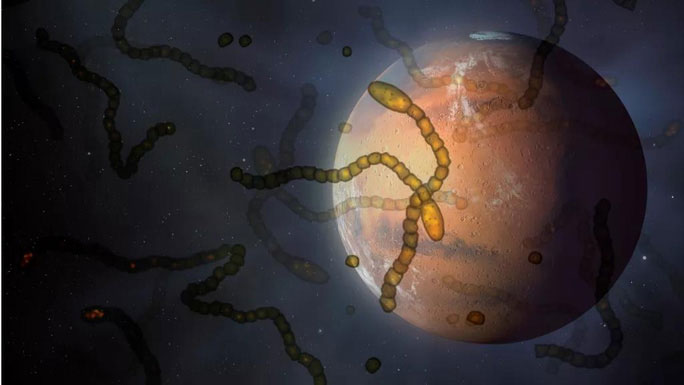An international study has warned of a very real risk of “biological contamination” associated with humanity’s journey to explore extraterrestrial worlds.
While many scientists believe that the moon may harbor life due to the Israeli spacecraft’s crash, which brought numerous “immortal” tardigrades (water bears) from Earth to this celestial body, a group of international researchers has raised a counter-concern: Earth’s life itself could be threatened by extraterrestrial organisms.

Extraterrestrial bacteria and viruses could threaten Earth – (Graphic image by Mark Garlick)
The recently published study in BioScience emphasizes that the extraterrestrial organisms posing risks are not bizarre creatures like those in movies, but rather simple and tiny: microorganisms. Despite their small size, they can indeed pose a threat of “interplanetary biological contamination.”
Professor Anthony Ricciardi from McGill University (Montreal, Canada), the lead author of the study, told Live Science: “As we face an increasing number of space missions, including those intended to bring samples back to Earth, it is crucial to minimize the risk of biological contamination in both directions.“
According to the authors, while bacteria are tiny, they can significantly impact ecosystems. For example, a South American fungus called Austropuccinia psidii has invaded Australia under uncertain circumstances, but certainly due to human activity, and is devastating native eucalyptus trees. Ecosystems are already vulnerable to alien species from completely isolated regions. The threat could be even greater if interplanetary biological contamination occurs.
The crash of the Israeli spacecraft named Beresheet was cited by the research team as an example. Although it seems that the tardigrades would not cause harm if they are indeed thriving on the moon, as this celestial body appears to have some form of life, this serves as a specific example of the risks that spacecraft may pose.
Therefore, the research team suggests enhancing biosafety measures related to space travel, focusing on the early detection of potential biological contaminants and rapid response procedures upon discovering unknown bacteria, viruses, or any suspicious substances that may have “hitchhiked” on spacecraft.
Space agencies around the world, especially NASA, have numerous interplanetary exploration missions planned for the near future, such as landers aimed at Jupiter’s moon Europa and Saturn’s moon Titan. Some spacecraft are also conducting sample-return missions from asteroids, like JAXA’s Hayabusa2 and NASA’s OSIRIS-REx, or efforts to collect rock samples from Mars by NASA…


















































